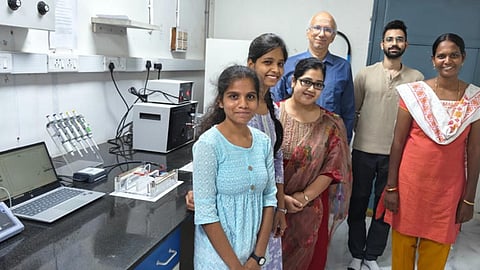

IIT Madras researchers have created an affordable chip-based device that rapidly detects whether bacteria are resistant or susceptible to antibiotics. Unlike traditional antimicrobial susceptibility testing (AST), which takes 48–72 hours, this lab-on-chip system delivers results in just three hours.
Antimicrobial resistance (AMR) is among the top ten threats to global health, according to the World Health Organization. In 2019 alone, AMR contributed to nearly 4.95 million deaths worldwide, with the heaviest toll in low- and middle-income countries lacking access to advanced diagnostics.
Conventional AST methods require culturing bacteria and testing them against antibiotics, a slow process that often pushes doctors to use broad-spectrum drugs, further driving resistance.
The IIT Madras team designed this device using screen-printed carbon electrodes in a microfluidic chip format, keeping costs low and usage simple. It applies Electrochemical Impedance Spectroscopy (EIS) to detect bacterial growth by monitoring electrical changes in a nutrient solution.
Professor S. Pushpavanam explained that the specially prepared nutrient medium not only supports bacterial growth but also improves the sensitivity of electrical detection. Dr. Richa Karmakar added that the system measures a "Normalised Impedance Signal" to differentiate resistant from susceptible strains in real time.
The device has been tested on gram-negative E. coli and gram-positive B. subtilis using antibiotics like ampicillin and tetracycline. It successfully identified resistance profiles within three hours and proved effective in spiked urine samples, highlighting its clinical potential.
According to the researchers, this technology could be lifesaving in intensive care units where rapid decisions are critical. Clinical validation is currently underway at the IIT Madras Institute Hospital, with commercialisation planned through the startup Kaappon Analytics India Pvt. Ltd.
The study, published in Nature Scientific Reports, represents a major step towards making rapid, affordable antibiotic resistance testing accessible across healthcare systems.